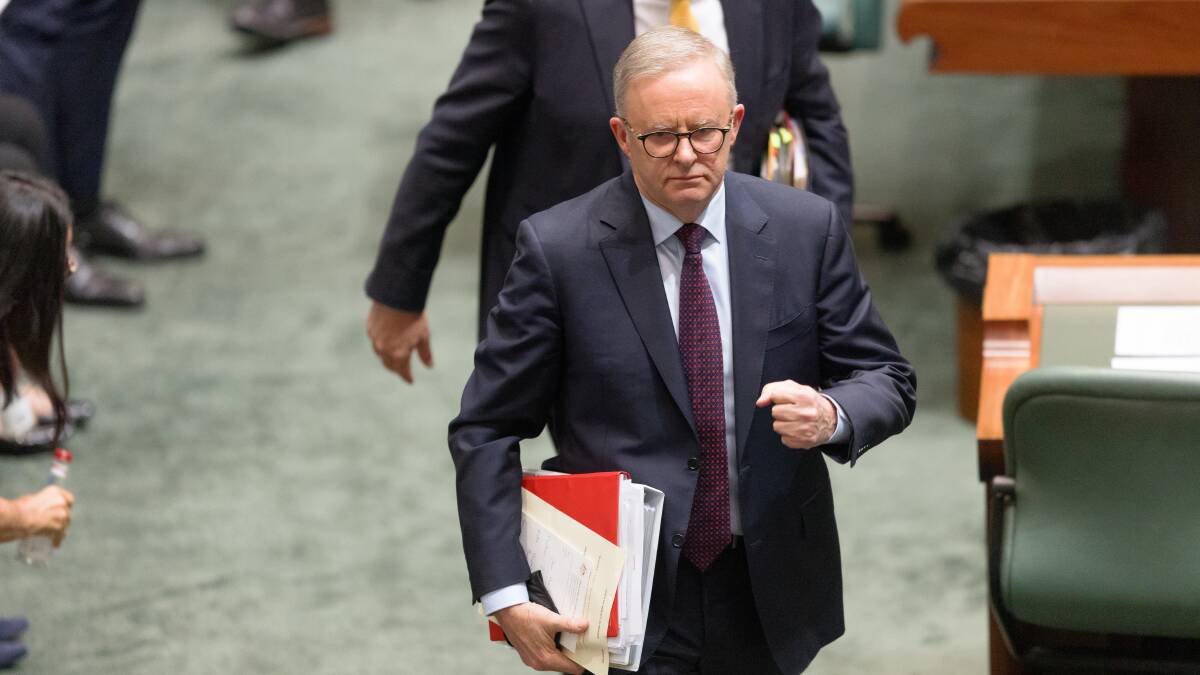It took just two weeks of the 47th Parliament to remind voters that politics isn't broken after all.
Some may have forgotten that politicians are sent to Canberra to govern, to improve laws, to lead and find a way forward - not merely to duck and weave while playing parlour games.
There were so many visual moments across that first fortnight, but perhaps none was more simultaneously mundane and yet significant than the sight of Climate Change Minister Chris Bowen genuinely entertaining crossbench amendments to the government's 2030/2050 emissions reduction bill.
Striking because Parliament had essentially stopped functioning under Scott Morrison who seemed to regard it as a pointless distraction or a slight against his faultless authority.
Of course, the other reason it was striking was that this respectful public negotiation occurred on emissions policy, an issue that has divided the polity like no other over the last decade.
Leader of the House, Tony Burke, eyed the historic shift.
"How long is it in this Parliament since we've had a situation where the crossbench move an amendment, the minister listens to the speech and the Parliament then makes a decision based on the debate?" he said in question time.
"For nine years the debate didn't even occur. For nine years the amendments weren't even allowed to be moved. And today what I saw in the Parliament was a situation, finally, where different members of Parliament- regardless of where they are in the chamber-brought forward their ideas, the debate mattered for the outcomes, and the Parliament voted."

The confidence of the new government under Albanese's surprisingly assured leadership contrasts with his tremulous election campaign, proving that performance in opposition is no reliable guide for future effectiveness.
Back when Tony Abbott was Liberal leader, some described him as the most effective opposition leader the country had seen. Hard-nosed and relentless, Abbott's concussive approach shook Labor to its foundations first pushing it into a soul-destroying leadership coup, then to a minority government, and finally to oblivion.
But Abbott's passion for wrecking a government was not matched by any aptitude for building one.
In office he proved hide-bound, idiosyncratic and inept as his 2013-14 broken promises budget, and his bizarre knighthood for the Queen's husband so colourfully attest.
Some PMs of course don't bother with being opposition leader at all, not when scheming could shorten the journey. Scott Morrison rose without trace and left the same way. No PM fading faster from view.
Albanese though, flips all this on its head.
Here we have an indifferent opposition leader who struggled to inspire and survived calls to make way for someone more "electable", transforming in the job.
Elected on a truncated agenda which also inspired little enthusiasm, Albanese has quickly emerged as a purposeful leader, a committed reformer and a distinctly different kind of PM - particularly in Parliament, where he seems fully at home, effortlessly in charge.
He may have only just started but already it is clear Albanese views the power of his office as a force to be deployed, transacted, and where necessary, distributed.
Not for him the satisfaction of fulfilling a life-long destiny. This was instantly clear on election night where his first words went to national leadership around delivering the generous Uluru Statement from the Heart "in full" - a nation-healing pledge that will take all his skill and be anything but straight-forward.
Nobody who gets to the job of prime minister is without ego. But Albanese's pride seems to stretch beyond his personage to something broader, something inherently representative and symbolic.
It is as if his election is the confirmation of his long-held confidence in his country and more particularly, in its capacity to grow richer for having included those from the peripheries, from less-advantaged backgrounds.
It is a collective, pluralistic pride in his working class roots, his life with a single mother, his party's ideals and its heroes.
Not since John Howard has Australia had a PM who so fully believes he should be there and who so fully understands the institutional machinery through which he rose.
Something of a Labor Party outsider, Kevin Rudd hid his insecurity by affecting a kind of folksy-familiarity to balance off his overt intellectualism and his psychological need to be the smartest guy in the room.
Julia Gillard wore her legitimacy doubts on her sleeve, all too aware of how she got the job, and of being the first female PM in a stubbornly masculine culture.
READ MORE:
Abbott, in a strange way, didn't fully try, carrying his hyper-partisan instincts into the job when something higher and more inclusively patriotic was required.
After being necked in 2009, Malcolm Turnbull wanted the job so badly he entered a Faustian pact, and yet still remained so insecure that he spent his premiership second-guessing himself, governing for his party room before the country.
And finally to Morrison. So shallow as to be unfit for office, his achievements were never going to compete with his smug moralism, his vaulting self-regard.
Alexander Downer - who knows first-hand about being an indifferent opposition leader - used to say that to be a successful party leader, one needed to have spent two decades in Parliament, really learning the ropes.
None of the above had done so - although Abbott was nearly there by 2013.
Howard had clocked up 22 years as an MP when he became PM in 1996. Albanese entered Parliament that same day.
Already it shows.
- Mark Kenny is The Canberra Times' political analyst and a professor at the ANU's Australian Studies Institute.


